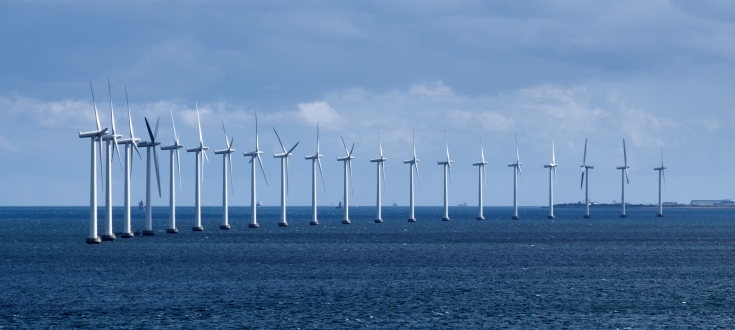The State We're In
Green investments critical to strong economy
The coronavirus hit hard, infecting over 1.5 million residents in the U.S. and triggering the worst economic crisis since the Great Depression. New Jersey is at the epicenter of the pandemic, with more COVID-19 cases than any state except New York.
Thanks to difficult but essential social distancing and reduced travel, the coronavirus is hopefully loosening its grip – at least for the time being – and the public health emergency is slowly improving. Our state and nation must now rebuild the economy while protecting health and safety at the same time.
Where to begin? How about investing in clean energy, parks and trails, and stronger protections for our waterways? These green investments will help the economy recover, create new jobs AND make communities healthier and safer.
Tim Sullivan, CEO of the New Jersey Economic Development Authority, recently identified clean energy as one of biggest opportunities to successfully restart the state’s economy. Mr. Sullivan also co-chairs the Governor’s Restart and Recovery Advisory Council, tasked with plotting a course for re-opening and repairing our economy.
In an op-ed on the ROI-NJ.com (Return On Information) business news site, Sullivan wrote that the clean/renewable energy sectors “are poised to add significantly to the state’s climate, energy, environmental and economic resilience. We should push harder than ever to prioritize the development of the offshore wind industry, and to make the package of resiliency- and environmental-justice driven investments outlined in Gov. Murphy’s Regional Greenhouse Gas Initiative strategic plan.”
Here’s some solid evidence that green investments can yield real bangs for the bucks:
Climate change – A new global study on fiscal recovery shows that climate-friendly policies would benefit economies and the environment. “The COVID-19 crisis could mark a turning point in progress on climate change,” according to a report in the Oxford Review of Economic Policy. The report recommends that industrialized countries invest in “clean physical infrastructure,” such as solar or wind farms and upgrading electric grids. It also recommends retrofitting buildings to improve energy efficiency, projects to restore or preserve ecosystems, and research into clean technologies.
Renewable energy jobs – Renewables like solar and wind create more jobs per unit of energy delivered than coal or natural gas, according to a 2010 study published in the journal Energy Policy. Stimulus spending on renewable energy also yields more jobs than fossil fuels. While $1 million in stimulus spending on oil and natural gas would generate roughly five jobs, the same amount invested in wind and solar would result in 13 to 14 jobs, according to a 2009 report.
Energy efficiency – The Economic Policy Institute, a national nonpartisan think tank, found that $50 billion in building retrofits and smart-grid investments would support 445,000 jobs across the U.S., or 8.9 jobs per million dollars invested.
Higher pay – Workers in clean energy earn higher and more equitable wages compared to all workers nationally, according to the Brookings Metropolitan Policy Program. Mean hourly wages in clean energy exceed national averages by 8 to 19 percent. Clean energy wages are also more equitable; even workers at lower ends of the income spectrum can earn more per hour than in other jobs.
Parks and trails – Investments in parks, trails, and open space and historic preservation contribute to both the economic recovery and public health. According to the Trust for Public Land, 23 jobs are created for every million dollars of direct agency spending on park operations, and 16 jobs for every million dollars of direct agency spending on capital improvements. Similarly, a study by the East Coast Greenway Association found that 17 jobs are created for every $1 million invested in trails.
Ecosystem services – Preserving natural lands provides ecosystem services like filtering impurities from water and preventing flooding. These conservation benefits equate to a strong return on investment, with a national average of $4 returned in natural services for every dollar invested. This return can be as high as $11 in some states.
The bottom line is that we don’t have to choose between a clean, healthy environment and a strong economy. We can have both! In fact, evidence shows that economic health declines when the environment is degraded.
Fortunately, New Jersey is planning for a clean energy future where most of the state’s energy comes from clean, renewable sources like solar and offshore wind. This is in stark contrast to the current administration in Washington, which is pushing for dozens of environmental rollbacks, putting clean water, air and public health at risk.
Now is the time for New Jersey to double down on its investment in clean energy, energy efficiency, open space, parks and trails!
These green investments are sure to appeal to millions of people here in the nation’s most densely populated state who have developed a newfound appreciation for natural lands, parks, clean air and water, and open spaces during the pandemic.
For more information on clean, renewable energy – including additional studies – visit the ReThink Energy NJ website at www.rethinkenergynj.org.
And to learn more about preserving New Jersey’s land and natural resources, visit the New Jersey Conservation Foundation website at www.njconservation.org or contact me at info@njconservation.org.
About the Authors
Alison Mitchell
Co-Executive Director
John S. Watson, Jr.
Co-Executive Director
Tom Gilbert
Co-Executive Director, 2022-2023
Michele S. Byers
Executive Director, 1999-2021
View their full bios here.
Filter
Get The Latest News
From The Garden State
In the
News

